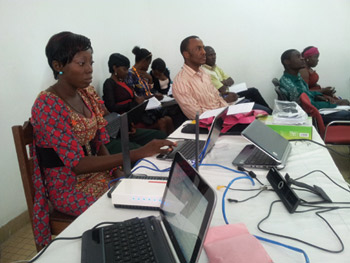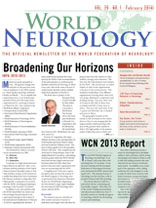
Participants in the web-based program in Cameroon.
Due to rapid demographic changes, the prevalence of Parkinson´s disease (PD) is increasing in sub-Saharan (SS) countries.1 In contrast to developed countries, evidence suggests that most patients with PD are underdiagnosed and untreated, with markedly increased mortality and shortage of qualified personnel.2 In the last years, there has been renewed interest from the World Health Organization, telecomunications companies and medical associations about the use of telemedicine in Africa.3
To help increase access to care and to train providers around the world using technology, the International Parkinson´s disease and Movement Disorder Society (MDS) has sponsored pilot projects in care and education that can lay the foundation for reaching the majority of people with PD. In this regard, a telemedicine program for health providers has been developed at Hospital Laquintinie in Douala, a 3 million inhabitants city of Cameroon.
The course is a web-based program that will provide participants with access to specialized education in the field of movement disorders, which is currently unavailable in their region. Local neurologists and professors at the University of Douala, including Jacques Doumbe, MD, chairman of the Department of Neurology (Hospital Laquintinie), and Erero Njiengwe, PhD (University of Douala) have significantly contributed to the implementation of this course at Hospital Laquintinie in Doula, Cameroon.
The course consists of 12 lectures over the course of a year, which will connect participants with experts in the field of movement disorders using live video, slides, chat and audioconferencing. The participants will have the opportunity to receive MDS membership and its benefits, including special education to certify them to use the MDS rating scales. Two courses have been launched — one designed for doctors (neurologists, neurology residents, primary care and internists) and another one for other health professionals (nurses, physiotherapists and psychologists).
The course will be taught by professors from Hospital Universitario de Burgos, Hospital 12 de Octubre, Hospital Clinico San Carlos, Hospital Sant Pau and Hospital Central de Asturias all from Spain; Rush University Medical Center, Columbia University, Rochester University, all in the United States, Parkinson Victoria Association, Health Sciences University all in Australia,Hospital Universitario Asturias, Spain, North Tyneside General Hospital in Great Britain and Hospital Galway and Parkinson Galway Association in Ireland. The main objectives of this pilot telemedicine education program will be to analyze the feasibility and adherence from participants, as well as satisfaction of users.
However, telemedicine for PD strategy development in Africa is challenging. It is still expensive, and most of the SS countries have inadequate and communication technologies infrastructure, which creates difficult implementation and little access to the population. Telemedicine also needs to demonstrate success and sustainability, and this type of initiative has to survive beyond the end of the initial funding period. Therefore, networking provides opportunities to spread the cost of infrastructure of telemedicine development between the local governments, business, foreign education providers and health sectors; therefore the cost burden should not be borne by just one sector. Telemedicine for PD should be recognized to remove or at least mitigate the barriers that society and physical geography imposes, especially rural areas in Africa, and to be culturally appropriate if they are to be adopted and sustained.
References
- Dotchin CL, Msuya O, Walker RW. The challenge of Parkinson’s disease management in Africa. Age Ageing 2007;36:122-7.
- Dotchin C, Walker R. The management of Parkinson’s disease in sub-Saharan Africa. Expert Rev Neurother;12:661-6.
- Scott RE, Mars M. Principles and framework for eHealth strategy development. J Med Internet Res. 2013 Jul 30;15(7):e155. doi: 10.2196/jmir.2250.
Coordinator
Esther Cubo MD, PhD
Academic Collaborators
Jacques Doumbe, MD; Erero Njiengwe, PhD; Sixto Cubo, PhD
Computer Engineers Team
Centro Servicios Avanzados (CSA), Burgos (Spain), Paul Onana, Computer Engineer, Douala (Cameroon)
Faculty Members
Ray Dorsey, MD; Christopher G. Goetz, MD; Katie Kompoliti, MD; Leo Verhagen, MD, PhD; Ellan Louis, MD; Richard Walker, MD; German Moris; Maria José Catalan, MD, PhD; Emily Wang, PhD; Meg Morris, PhD; Victor McConvey, RN; Antonio Campolungo, RN; Marie Cahill; Patrick Browne, RN; Jose Maria Trejo Gabriel y Galán MD, PhD
Sponsor
International Parkinson´s disease and Movement Disorder Society, through the Telemedicine Task Force
